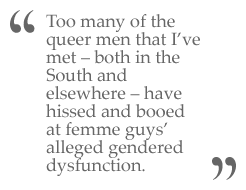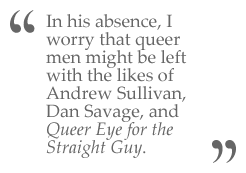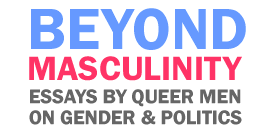 Sitting in those
meetings, I couldn’t help but to think that my more
effeminate friends and I were likely to be some of the
people they were working to make invisible. Hostility
towards nelly faggots like me, in my experience, has
come from both inside and outside queer communities. Gay
men, in particular, seem to be guilty of this kind of
gender policing. Too many of the queer men that I’ve met
– both in the South and elsewhere – have hissed and
booed at femme guys’ alleged gendered dysfunction. They
say that our stereotypically homo affect is some
combination of awful things like superficiality or
immaturity. “Why can’t you just be normal, for God’s
sake?” They want us to keep our faggotry to ourselves,
lest we give them all a bad name.
Sitting in those
meetings, I couldn’t help but to think that my more
effeminate friends and I were likely to be some of the
people they were working to make invisible. Hostility
towards nelly faggots like me, in my experience, has
come from both inside and outside queer communities. Gay
men, in particular, seem to be guilty of this kind of
gender policing. Too many of the queer men that I’ve met
– both in the South and elsewhere – have hissed and
booed at femme guys’ alleged gendered dysfunction. They
say that our stereotypically homo affect is some
combination of awful things like superficiality or
immaturity. “Why can’t you just be normal, for God’s
sake?” They want us to keep our faggotry to ourselves,
lest we give them all a bad name.
But I can’t. And I
won’t. I spent far too much of my life trying to contain
my faghood to satisfy others. If I am loud or
eccentrically feminine today, it is because of the years
of putting up with a patriarchal, heterosexist culture
that constantly reminded me of my inferiority.
Everywhere faggots like me look, we are reminded of just
how pathetic or pathological we are: news reports,
television shows, music videos, school books, romance
novels, stand up comedians, product advertisements,
televangelists, politicians, and scientific studies.
From time to time, even the people who are allegedly
fighting for us tell guys like me to butch it up.
I have exactly two words for them:
Fuck. You.
Guys like me create camp
to survive. It was our protection from a world
that took pleasure in ridiculing us; camp was our
multipurpose second skin. It was, for me, a way to try
to reclaim some of my eccentric spirit that my peers had
crushed in middle school. It lets us make comedy out of
tragedy and fools out of idols. It is our own way of
making some sense out of a culture that only makes room
for nelly boys when we design their houses or when we’re
needed for psychological studies.
I have come to realize
that there are few winners in a world fraught with such
manic gender policing. I’m not referring here just to
women, who are obviously undervalued and often
infantilized in American culture. Straight men, often
pegged categorically as the winners under patriarchy,
often suffer as well, under the constraints of hegemonic
masculinity. While it is true that straight men
collectively hold many of the cards, it is easy to
forget that as individuals their struggles with gender
can be deeply emotionally damaging. Gender, at least as
it is currently understood, makes free expression
nothing short of impossible – for all of us.
I anticipated – I had
hoped – to find a more, shall we say, enlightened
politics and community in my move to San Francisco. I
was shocked and disappointed to find that queer
communities in small towns in the South were often far
more politically savvy and radical in their vision for
change than many of the people I have met in California.
Many of the men I met while living in San Francisco saw
little impetus to fight for change, perhaps because they
have never really faced the kind of day-to-day animosity
that queers face in the South. My worry is now that, as
homophobia goes the way of racism and sexism and becomes
more nuanced, less blatant, and disproportionately
damaging to those on the bottom, queer people will
generally be less inclined towards radical politics that
challenge the status quo.
It was truly a sad day
when one of the incredibly few queer male feminist
mentors and leaders I had found, Eric Rofes,
unexpectedly died. He was one of a tiny number of gay
male leaders, in my opinion, who spoke progressive
values to action. His memorial service in San Francisco
was a first for me. With the exception of a cousin I
barely knew who died when I was very young, death has
kept a distance from my life. Highlighting the stark
difference between my own life and Eric’s, Amber
Hollibaugh closed the service by reading from his
harrowing and eloquent account of the utter loss he
experienced in the early years of the HIV/AIDS epidemic
in his book, Reviving the Tribe. In a fitting
tribute, Sylvester’s disco anthem “You Make Me Feel
(Mighty Real)” played louder and louder as she read
until it was reverberating in the large room.
 My anguish over Eric’s
passing was heightened by a sinking feeling that there
would be no other queer man to fill his shoes. Despite
the tensions that still exist between the kind of sexual
liberation that gay men have spearheaded and the
women-driven feminist movement, Eric had managed to
straddle both. This was no small feat. In his absence, I
worry that queer men might be left with the likes of
Andrew Sullivan, Dan Savage, and Queer Eye for the
Straight Guy.
My anguish over Eric’s
passing was heightened by a sinking feeling that there
would be no other queer man to fill his shoes. Despite
the tensions that still exist between the kind of sexual
liberation that gay men have spearheaded and the
women-driven feminist movement, Eric had managed to
straddle both. This was no small feat. In his absence, I
worry that queer men might be left with the likes of
Andrew Sullivan, Dan Savage, and Queer Eye for the
Straight Guy.
I, for one, hope we can
do better. The progressive queer male leaders and
thinkers of tomorrow may very well be those of us who
continue to live as outsiders in American life: men of
color, sissies, sex workers, men with disabilities,
transgender men, and those of us born in places where
homophobia is still a constant, acute threat. For me, it
was the experience of growing up nelly in the South that
made ignoring the pervasive inequality in America
difficult, if not impossible.
It is that outsider
status that I cherish so dearly. It grants a certain
ability to see what those on the inside cannot.
“American by birth, Southern by the grace of God.”
Despite all of my trials and tribulations, I wouldn’t
have it any other way.




16 COMMENTS ON THIS ESSAY:
"Gender, at least as it is currently understood, makes free expression nothing short of impossible – for all of us."
WOW!! This line struck me more than anything-- and there was a lot about this essay that I really connected with. I think that even within the gay community, gender plays a terrible constricting role. Your examples of the Boston "bigwigs" who wanted to parade out the "acceptable" homosexuals is one way this plays out within our community.
With this project, and your writing, I'd say you are well on your way toward becoming a role-model and opinion leader for gay men, much in the grain of Eric Rofes. Sullivan, Savage, and the Queer Eye Cast don't got nothing on you, honey!!
Jason -- thank you for your kind words :)
beautiful essay.
I'm an MTF transsexual, and I live in the Philippines, so I can't say that I identify 100% with the experiences that you'e described. Still, the article is touching, and it is scarily illuminating: much of the gay culture that I've come into contact with seems all to eager to shun minorities within the subgroup that are "embarassing" or "contrary to the cause".
I loved it, keep up the good work : )
What you wrote was interesting but I really don't get what you plan on doing with your life. This and trevorhoppe.com seem more like a hobby than anything else. I would assume your are living off of your parents money to fund everything. I don't see what purpose any of this serves. Sure growing up gay is difficult. It's not accepted as normal anywhere in the world. I know it is normal because i'm gay. You have to learn some things on your own.You are feminine and so are a lot of other guys but there is not as far as I know any reason to study it. Thats what gaydar is you can pick out some hint of being feminine. What difference does being gay have to do with anything anyway? It's who you like to be with or have sex with. Try getting a job where you need to work for a year and them write about how a rich kid actually worked for a year. Paris Hilton you aren't.
Trevor,
You have impressed me greatly. Who would have ever thought after our first one or two meetings we'd still be in communication.
Although I know you think I'm the most egocentric person you ever have met, I foresee great promise and future in all of your endeavors.
You're a great man Charlie Brown. Please keep me informed of any and all published work you have forthcoming, I truly enjoy reading it all.
I miss our fights and those long lectures.... Don't tell anyone, but I may not vote R this time...
Hope you and your family are all well.
Much Love,
Burge
This is great, I loved it. It captured something I really regret about my own life - hardening up, developing sharp edges, and feeling ashamed of the gentle self I was as a child.
I'm interested as well by the response of the commenter Jeremy (above, 1 Sep 08), as it reminds me of responses to my own work on sexual racism. It seems quite strained as he labours to construct a class difference he can invoke as a reason to hate 'on' you. He really, really doesn't want anyone to ask these questions, does he? For some, the indeterminacy that we've learned to cherish is a frightening place they're keen to leave as far behind them as possible.
Daniel -- Yes, the comment from Jeremy is disingenuous at best. He makes some big assumptions about me and my life, without hesitation. I guess I never responded out of some shame that I am an academic, and a recognition that that comes out of a place of privilege. I'm not sure when the idea came around that arguments from anyone with privilege are worthless, but its surely pervasive in feminist / queer / anti-academic circles (those are separate but overlapping spheres). But one thing is clear: he had no interest in engaging the arguments, and instead decided to write a hit piece on me. That's all too often how we engage.
Hi Trevor,
That was a very eloquent essay and I was truly touched by it. Although my experiences so far in life have been very different from yours--I'm a young woman who has grown up in very open-minded communities in the North and who now identifies as "interested in people" (what most people would call bisexual)--you articulated a lot of things that have been on my mind recently and that I've discussed and tried to express with my friends. Thank you for giving my feelings words.
I just found this website and I really like the essays and messages. Good luck with everything you do in the future.
Thanks, Tamar! I hope you enjoy the other essays in the collection! And please do spread the word! xoxo
Amongst other things, as someone formally interested in web design, I wanted to say how wonderful the design of this website is. It reminds me of google in its concept- clear, clean, simple, effective, accessable- which makes it all the more beautiful. The one thing I would suggest though is that the essays themselves are inside an iframe, as to reduce loading time.
I have a slightly different interpretation of those days. However, it was interesting to read about how you perceived who I was. Your perception is very valid and made me giggle, though I feel it paints a picture that is not all that close to my actual reality at the time. Not to say that I wasn't going through similar hardship, but I think I was coming from a very different place and I took a very different path. I haven't finished the article, busy trying to memorize music, but I will finish it soon and would like to talk about this later. Cheers!
Paolo
I thoroughly enjoyed this great essay. Perhaps this is a cheap point, but it reminded me of the pain and humiliation individuals face when they fall outside of gender boundaries. It's those individuals I need to be fighting for, even more so than myself.
As an 18-year-old feminine transgender man who's interested in activism and the intersections of oppressions, I'm having a hard time finding inspiring queer male role models who critique society in the way that you do. This site--and your fantastic essay--makes me hopeful. Thank you.
Aw thanks Oliver :) I'm glad you're finding the collection useful! xoxo
Trevor, wonderful piece! You are a brilliant writer with a great voice. I agree with your closing comments that as the more extreme forms of homophobia shift to the background of our culture, they have a disproportionate impact on poorer and more rural gay populations. You are right on in your fear that the big cities may become complacent and less likely to shake the status quo. But why the attacks on Dan Savage and Andrew Sullivan? Aren't they good examples of queer, "out-there" people who are fighting for gay marriage, comprehensive sex education, and acceptance for gay youth via the "It Gets Better Project". I wouldn't paint them with the same heteronormative brush just because they've gone mainstream, they still have a lot to offer to the conversation on gender and sexual equality.
Hey David, thanks for your comment. I've mellowed out a bit politically since writing this piece. But Dan Savage I think has really repugnant politics when it comes to deviant sex, and it frustrates me. The "It Gets Better" campaign was pretty incredible - though I'd like to see half that energy put into actually getting legislation changed. But I understand that cultural campaigns like that can often have powerful effects, sometimes moreso than legal change.
Andrew Sullivan has all but repented for his neoconservative years. The work he's been doing on immigration equality has been tremendous.
Anyways, glad you've enjoyed the piece. Hope you enjoyed other ones here! xoxo